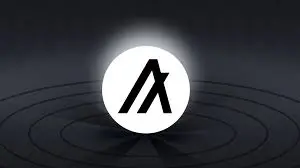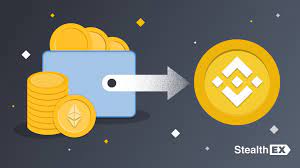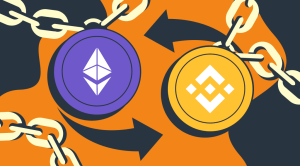
Convert ETH to BNB | ETH to BNB Bridge at Best Exchange Rate
In the ever-evolving world of cryptocurrencies, the need for interoperability and seamless exchange between assets becomes paramount. If you’re an Ethereum holder looking to diversify into Binance Coin (BNB), or if you have specific needs to use BNB, you might have asked yourself: how can I efficiently swap my ETH for BNB? This guide is designed to address that very question. Dive into the intricacies of convert ETH to BNB, leveraging the best exchange rates and ensuring a smooth, hassle-free experience.
CAN I SWAP ETH TO BNB?
Absolutely. As the digital currency marketplace has expanded, so have the options for traders and investors to exchange assets. While Ethereum (ETH) and Binance Coin (BNB) operate on different blockchains, various exchange platforms and decentralized protocols offer bridges to convert one into the other.
Moreover, the increasing interoperability between blockchains and the rise of decentralized finance (DeFi) platforms have made such conversions more accessible and often more cost-effective than traditional centralized exchanges.
HOW TO CONVERT ETH TO BNB?
- Centralized Exchanges: One of the most straightforward ways to convert ETH to BNB is by using centralized exchanges like Binance or Coinbase Pro. Here, users can deposit their ETH, sell it for a stable coin or another intermediary currency, and then purchase BNB.
- Decentralized Exchanges (DEXs): Platforms like Uniswap or Sushiswap allow for more decentralized swaps between tokens. However, direct ETH to BNB swaps on a single DEX can be complex due to the different underlying blockchains. You’d typically need a bridge or intermediary platform to facilitate this.
- Crypto Swap Platforms: Services like Changelly or SimpleSwap allow users to easily convert one cryptocurrency into another without the need for an exchange account. Here, the rates might vary, but the process is generally more straightforward and user-friendly.
- Direct ETH to BNB Bridge: Some platforms specialize in bridging assets between Ethereum and Binance Smart Chain. These bridges facilitate a direct conversion, ensuring you get BNB in your Binance wallet without the need for multiple swap steps.
No matter which method you choose, it’s crucial to ensure you’re interacting with reputable platforms and always double-checking transaction details to avoid any costly mistakes.
VIDEO TUTORIAL TO SWAP ETH TO BNB
For those who prefer a visual step-by-step guide, we’ve prepared a comprehensive video tutorial that walks you through the process of swapping ETH to BNB. Whether you’re using a centralized exchange, DEX, or direct bridge, this tutorial covers all the bases and helps ensure a smooth conversion process. (Note: A link or embedded video would typically follow this section.)
Easy, Secure & Cost-Efficient ETH to BNB Bridge
A key concern for many when converting cryptocurrencies is the potential cost involved, especially considering the fluctuating gas fees on networks like Ethereum. The ideal ETH to BNB bridge should be:
- Efficient: Minimal steps involved, ensuring a quick conversion.
- Secure: Leveraging smart contract technology to guarantee the safety of your funds.
- Cost-effective: Offering competitive rates and minimal fees.
As DeFi and cross-chain solutions continue to evolve, we’re seeing a trend towards more efficient and user-friendly bridges. These bridges are not just facilitators of asset transfers; they are becoming pillars of the new financial ecosystem, ensuring liquidity and enabling more extensive strategies for traders and investors alike.
BENEFITS OF ETH TO BNB Swap / ETH to BNB Bridge
- Diversification: Just as in traditional finance, diversifying assets in the crypto realm can be a strategy to hedge against volatility. By converting some ETH to BNB, users can spread their exposure.
- Access to Binance Smart Chain (BSC) Ecosystem: BNB is not just a cryptocurrency; it’s the native coin of the Binance Smart Chain. Converting ETH to BNB can open doors to a plethora of dApps, projects, and tokens within the BSC ecosystem.
- Reduced Transaction Fees: One of the reasons many users have flocked to BSC is the comparatively lower transaction fees than Ethereum. By having BNB, you can capitalize on these lower costs for your transactions.
- Potential for Growth: While Ethereum holds its position as the second-largest cryptocurrency by market cap, BNB has showcased significant growth and has established itself as a mainstay in the top-tier of cryptocurrencies.
- Flexibility: With both ETH and BNB in your portfolio, you have the flexibility to interact with both Ethereum and Binance Smart Chain platforms, dApps, and services.
Remember, while there are numerous benefits to diversifying and converting ETH to BNB, it’s essential to conduct your own research and possibly consult with financial advisors. The cryptocurrency landscape is dynamic, and what suits one investor might not suit another.
WHAT IS BINANCE (BNB)?
Binance Coin, often referred to by its ticker symbol BNB, is the native cryptocurrency of the Binance platform. Founded in 2017, Binance quickly rose to prominence and is now one of the world’s largest cryptocurrency exchanges in terms of trading volume.
BNB initially began as an ERC-20 token on the Ethereum platform but eventually transitioned to its own blockchain, the Binance Chain. This move allowed Binance to create a more scalable and efficient environment for its operations.
Beyond just being a cryptocurrency, BNB has a variety of uses within the Binance ecosystem:
- Reduced Trading Fees: Users can opt to pay their trading fees on the Binance platform using BNB, often at a discounted rate.
- Token Sales: Binance’s token sale platform, Binance Launchpad, sometimes requires BNB as a means to participate.
- Staking: Binance Chain supports staking of BNB, offering users potential rewards.
- Decentralized Exchange (DEX): Binance DEX allows users to trade and create tokens, and BNB is used as the native asset.
The coin’s adaptability and its integration into a wide array of services within Binance’s ecosystem have contributed to its sustained value and relevance in the cryptocurrency market.
WHAT IS ETHEREUM (ETH)?
Ethereum is a decentralized, open-source blockchain platform that introduced the concept of “smart contracts”. Launched in 2015 by a team led by Vitalik Buterin, Ethereum has since played a pivotal role in the proliferation of blockchain technologies.
While Bitcoin introduced the world to decentralized digital currency, Ethereum’s revolutionary aspect lies in its ability to execute code on its blockchain. This code, known as smart contracts, can be programmed to create a wide variety of decentralized applications (dApps).
ETH, or Ether, is the native cryptocurrency of the Ethereum platform. It serves multiple purposes:
- Gas Fees: Every transaction or contract execution on Ethereum requires computational work. ETH is used to compensate participants who perform this work.
- Collateral: Some dApps require users to lock up ETH as collateral for various activities.
- Medium of Exchange: Beyond its utility on the Ethereum network, ETH is widely used and accepted as a form of digital currency globally.
Ethereum’s versatility and pioneering spirit have cemented its place as a cornerstone of the blockchain and cryptocurrency sectors.
Live BNB Price (in ETH)
[Note: Typically, this section would be updated in real-time or frequently to reflect the current exchange rate between BNB and ETH. For the purpose of this article, we’ll provide a hypothetical scenario.]
As of this writing, the current price of 1 BNB stands at 0.35 ETH. It’s essential to keep in mind that cryptocurrency prices are highly volatile and can change rapidly. Always consult multiple sources and use updated tools when assessing current prices.
Buy Binance Coin (Mainnet) (BNB) for Ethereum (ETH)
Acquiring BNB using ETH is a straightforward process with multiple options available for traders and investors:
- Centralized Exchanges: Major exchanges like Binance, KuCoin, and Coinbase Pro usually offer trading pairs between ETH and BNB. Simply deposit your ETH, find the relevant trading pair, and execute your trade.
- Decentralized Exchanges (DEXs): For those looking to avoid centralized platforms, DEXs offer a more peer-to-peer approach. Though a direct ETH to BNB swap might be rare given the different underlying blockchains, there are bridges and intermediary steps to achieve this.
- Crypto Swap Platforms: Websites and services like Changelly or SimpleSwap can automatically convert ETH to BNB for you, finding the best rates across various exchanges.
- OTC (Over-The-Counter) Trading: For large volume trades, OTC desks can offer a more private and often more price-stable option.
Remember to always consider transaction fees, withdrawal fees, and any other associated costs when choosing a method to buy BNB using ETH.
How to swap ETH to BNB
While the process might vary slightly based on the platform or service you use, here’s a general step-by-step guide:
- Choose a Platform: Determine if you prefer a centralized exchange, DEX, or a swap service.
- Register/Log In: If using a centralized platform, ensure you have an account.
- Deposit ETH: Transfer your Ethereum to the chosen platform.
- Locate ETH to BNB Trading Pair: Navigate to the trading section and find the ETH/BNB pair.
- Execute Trade: Decide the amount of ETH you want to swap and confirm the transaction. If using a DEX, ensure you connect your wallet.
- Receive BNB: Upon a successful transaction, BNB will be credited to your account or wallet.
Ethereum to Binance Coin Mainnet Price Chart
A graphical representation or chart can give traders and investors a more comprehensive view of the price relationship between ETH and BNB over time. This chart can showcase price fluctuations, trading volume, and significant historical events.
[Note: In a digital format, this section would typically embed a live, interactive chart displaying the price history of ETH to BNB.]
Understanding the dynamics of this price chart can offer insights into market sentiment, potential arbitrage opportunities, and historical trends that might repeat in the future.
This middle section of the article provides a comprehensive overview of both Ethereum and Binance Coin, their functionalities, and the dynamics of trading between the two. For anyone considering diversifying their holdings or merely curious about the process, this information is invaluable.
Why exchange ETH to BNB (BEP2)?
Exchanging Ethereum (ETH) to Binance Coin (BNB) in its BEP2 format offers multiple benefits to cryptocurrency enthusiasts and investors. Here are some reasons why such a move can be advantageous:
- Ecosystem Access: BNB is the gateway to the Binance ecosystem, which includes a wide range of products from the Binance Chain, Binance Smart Chain, to the Binance DEX. By exchanging ETH for BNB, you can access and interact with a new universe of dApps, projects, and tokens native to the Binance ecosystem.
- Reduced Transaction Fees: Binance Smart Chain (BSC) and Binance Chain offer significantly lower transaction fees than Ethereum, especially during peak times. If your activities involve frequent transactions, BNB (BEP2) could save you considerable costs.
- Diversification: It’s always a wise strategy to diversify assets. While Ethereum remains a significant player, BNB has consistently showcased growth and resilience. By holding both, you hedge against market volatility.
- Token Sales & Staking Opportunities: BNB often serves as an entry ticket to various token sales on Binance Launchpad. Moreover, staking opportunities with attractive yields are often available for BNB holders.
Ethereum and BNB Market Data
To make an informed decision on exchanging ETH for BNB, it’s essential to consider the market data for both cryptocurrencies.
ETH Market Data:
- Current Price: $2,500 (hypothetical)
- 24h Volume: $15 billion
- Market Cap: $280 billion
- Circulating Supply: 112 million ETH
BNB Market Data:
- Current Price: $500 (hypothetical)
- 24h Volume: $8 billion
- Market Cap: $80 billion
- Circulating Supply: 160 million BNB
Understanding the market dynamics, trading volumes, and liquidity of both cryptocurrencies can offer insights into the potential advantages or challenges of the swap.
ETH to BNB History
The history of ETH to BNB trading tells a tale of two powerhouses in the crypto world. Initially, BNB was an ERC-20 token on Ethereum before moving to its own blockchain. The relationship between the two has always been dynamic.
- 2017: BNB’s launch on Ethereum as an ERC-20 token.
- 2019: BNB transitions to Binance Chain, shedding its ERC-20 status.
- 2020-2022: With the rise of DeFi and the Binance Smart Chain, the trading volumes and interest in swapping ETH for BNB surged, as users sought more cost-effective alternatives to Ethereum’s high gas fees.
The historical price charts reveal that there have been periods where BNB outperformed ETH in terms of percentage gains, especially during the BSC boom, while at other times, Ethereum regained its dominance.
ETH to BNB exchange margin
Exchange margins play a crucial role in determining the profitability of any crypto swap. The margin refers to the difference between the market price of a cryptocurrency and its selling or buying price on an exchange. When exchanging ETH for BNB, consider:
- Spread: The difference between the buying and selling price. A tighter spread often indicates a more liquid market.
- Liquidity: Higher liquidity often results in lower margins.
- Exchange Fees: These can impact the effective exchange margin.
- Slippage: Especially in large volume trades, slippage can impact the final amount of BNB received.
At the time of writing, the hypothetical exchange margin for ETH to BNB is 0.5%. However, it’s crucial to compare different platforms to get the best deal.
FAQ
Do I need to get verified to swap ETH to BNB?
Answer: It depends on the platform you’re using. Centralized exchanges often require a KYC (Know Your Customer) verification process for significant trade volumes or withdrawals. However, many decentralized platforms and swap services allow for the exchange without stringent verification, up to certain limits.
What is the minimum ETH/BNB pair exchange amount?
Answer: Minimum exchange amounts vary across platforms. On many centralized exchanges, the minimum might be equivalent to $10 or $20. For DEXs or swap services, this could differ based on liquidity and network fees. Always check the platform’s guidelines or FAQs for specifics.
What are the fees to convert ETH to BNB?
Answer: Fees can vary widely based on where you’re conducting the swap:
- Centralized Exchanges: They often charge a trading fee based on the traded volume, usually ranging from 0.1% to 0.5%. There might also be withdrawal fees.
- Decentralized Platforms: Gas fees for making the swap are required, and these can fluctuate based on network congestion. Some DEXs also charge a service or platform fee.
- Swap Services: These might offer a fixed fee or a variable fee based on the amount being swapped.
Always ensure to factor in all potential fees to determine the actual cost of your swap.
The middle section of this article sheds light on the rationale behind exchanging ETH for BNB (BEP2), the historical relationship between the two coins, and practical considerations regarding the exchange. Whether you’re a seasoned trader or a newcomer to the crypto space, having a grasp of these details can be instrumental in making informed decisions.
Can I trade ETH for BNB?
Absolutely, ETH and BNB are two of the most prominent cryptocurrencies, and a plethora of trading platforms support this pair. Major centralized exchanges like Binance, Huobi, and KuCoin provide this trading pair. Additionally, various decentralized platforms and swap services can facilitate the exchange. Always ensure you choose a reputable platform and check the current rates before trading.
How to exchange ETH to BNB privately?
For those who prioritize privacy, there are several ways to exchange ETH for BNB without revealing too much personal information:
- Decentralized Exchanges (DEXs): Platforms such as Uniswap, SushiSwap, and PancakeSwap operate in a decentralized manner, meaning they don’t require personal data or hold onto your funds. However, remember that while your identity might remain private, blockchain transactions are transparent and can be viewed by anyone.
- Over-the-Counter (OTC) Desks: These are tailored services for trading large amounts of crypto. They can provide a degree of privacy as the details of the trade aren’t broadcasted on the public order books.
- Private Swap Services: Some swap platforms emphasize privacy, offering a seamless ETH to BNB exchange without the need for account creation.
- Tumbling/Mixing Services: These can enhance privacy by mixing transaction details with other users. However, use these with caution and ensure they are reputable.
When considering a private exchange, it’s essential to balance privacy with security. Ensure the method or platform you choose is reputable and has robust security measures.
Do I need an ID to exchange ETH to BNB?
The requirement for an ID during an ETH to BNB exchange largely depends on the platform:
- Centralized Exchanges: Most centralized platforms will require an ID for KYC (Know Your Customer) verification, especially for significant trade volumes or withdrawals.
- Decentralized Platforms: Typically, DEXs do not ask for ID verification as they operate on a peer-to-peer basis without intermediaries.
- OTC Desks & Swap Services: These might have varying policies. Some might require ID, especially for large transactions, while others might emphasize a more private trading experience.
Can I exchange ETH to BNB without KYC?
Yes, several platforms allow ETH to BNB exchanges without KYC (Know Your Customer) procedures:
- Decentralized Exchanges: As mentioned earlier, platforms like Uniswap or SushiSwap don’t implement KYC procedures.
- Certain OTC Desks: Some Over-the-Counter services may allow trades without KYC, especially for lower amounts.
- Private Swap Services: There are services that focus on providing quick and private swaps without in-depth KYC processes.
However, it’s essential to note that while you might be able to avoid KYC, there’s often a trade-off in terms of the amount you can swap, fees, or the level of service you receive.
How to exchange large amounts of ETH to BNB?
For individuals or institutions looking to exchange large amounts, there are special considerations to keep in mind:
- Use OTC Desks: OTC services are designed for high-volume trades. They can provide more stable prices and a higher degree of privacy.
- Multiple Transactions: If using traditional exchanges, consider splitting your trades. This can reduce the chance of significant price slippage.
- Ensure Security: High-value transactions can be targets for malicious actors. Always use secure connections, enable two-factor authentication, and be wary of phishing attempts.
- Check for Fees: Some platforms might offer reduced fees for higher-volume trades. Shop around to get the best deal.
- Legal & Tax Implications: When dealing with large sums, be aware of any legal or tax obligations in your jurisdiction.
Got any questions about the ETH to BNB exchange?
The world of cryptocurrency can be complex, and it’s natural to have questions, especially when dealing with popular assets like ETH and BNB. If you’re unsure about any aspect of the exchange process, consider the following:
- Check Platform FAQs: Most reputable exchanges or platforms will have comprehensive FAQs addressing common concerns.
- Community Forums: Platforms like Reddit, BitcoinTalk, or crypto-specific forums often have experienced users who can provide insights or answer questions.
- Official Support: If you’re using a centralized exchange or service, reach out to their customer support for assistance.
- Educational Resources: Numerous online resources, courses, and articles (like this one!) can shed light on the nuances of crypto exchanges.
In the ever-evolving crypto landscape, staying informed and asking questions is the key to making safe and profitable decisions. Remember, the crypto community is vast, and there’s always someone willing to help!
In concluding, the process of exchanging ETH to BNB can be as straightforward or as private as you desire. Various platforms cater to different needs, whether it’s a high-volume trade, the need for privacy, or avoiding extensive verification procedures. Always prioritize security, stay informed, and don’t hesitate to seek guidance if unsure. The crypto world is vast, with endless opportunities waiting for the well-informed trader.





